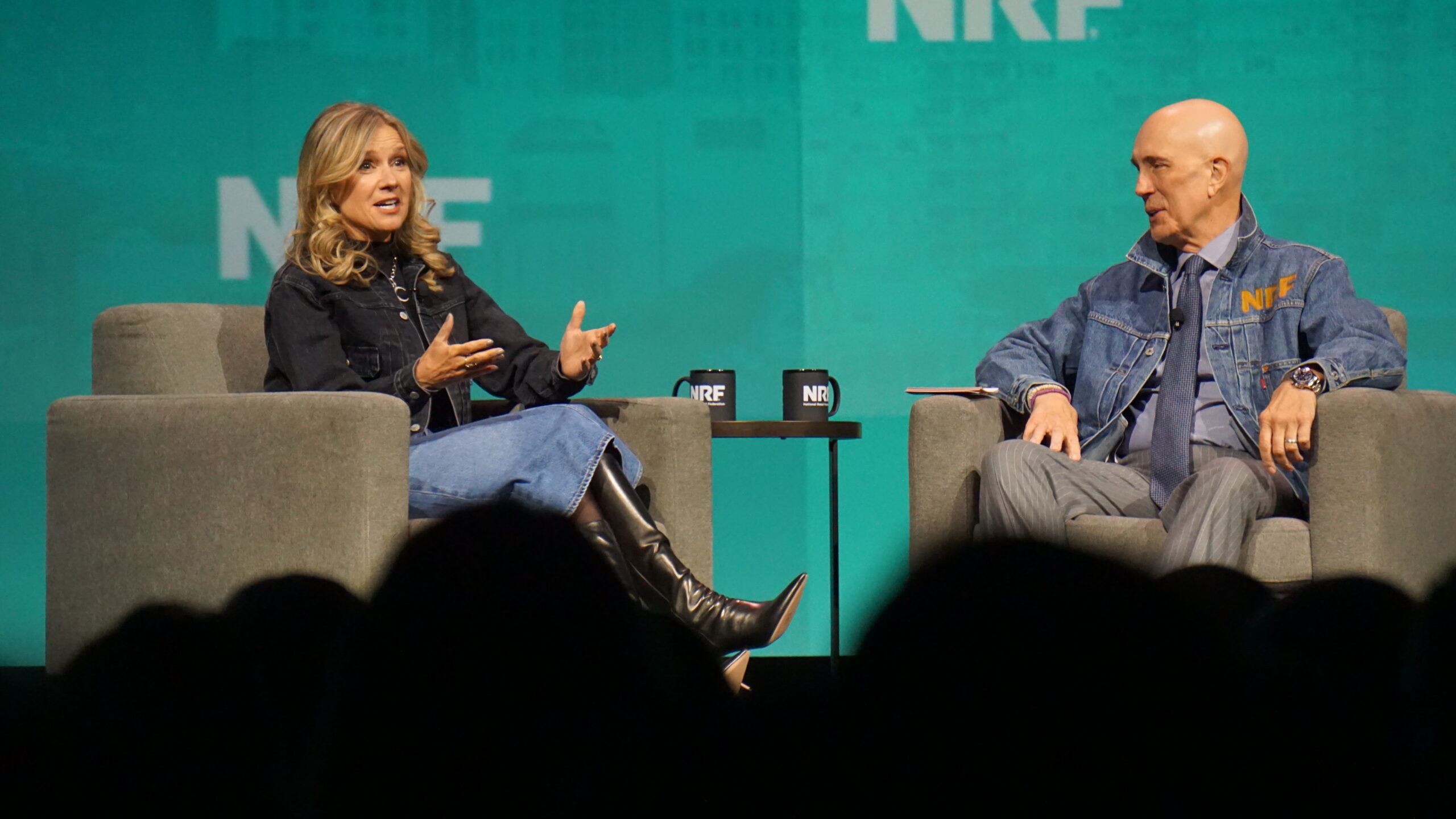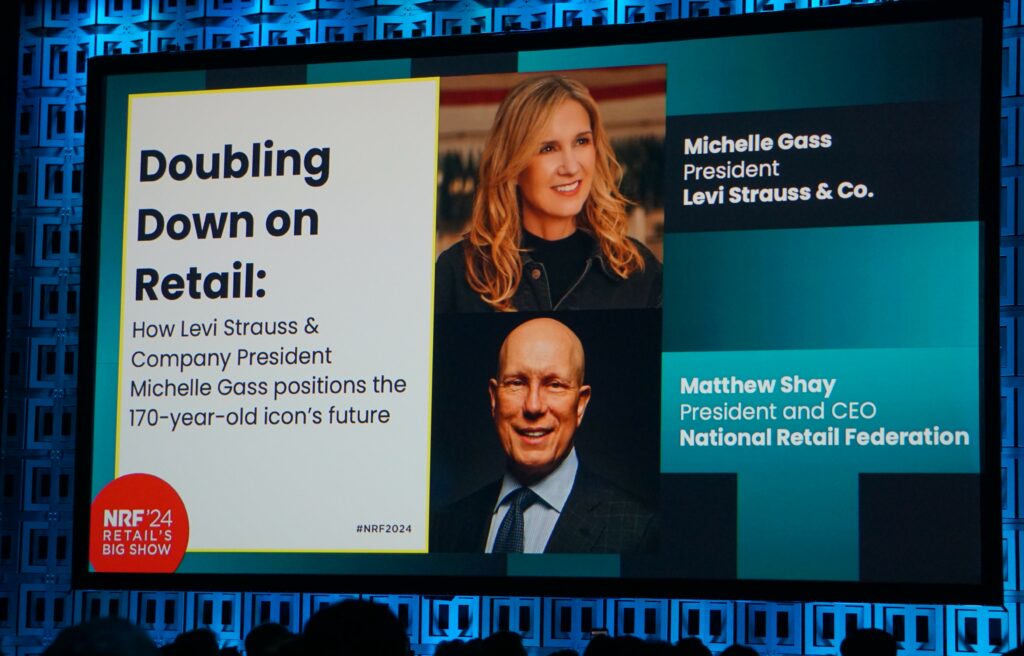
Photo: Jamie Tenser
NRF Big Show: Levi’s Incoming CEO Offers Lessons in Brand Building
Speaking Sunday at NRF 2024: Retail’s Big Show, Michelle Gass, Levi Strauss & Co.’s incoming CEO, highlighted five key learnings over her 33-year retail career ranging from the power of brands to the culture that’s prepared her to guide the iconic denim brand’s next stage of growth.
After beginning her career at Procter & Gamble (P&G), Gass worked for nearly 17 years at Starbucks, ending as president, EMEA. In 2013, she joined Kohl’s as chief merchant and customer officer and was promoted to CEO in 2018. In January 2023, she became Levi’s president, and she will replace Chip Bergh, the brand’s long-time CEO, as part of a succession plan on Jan. 29.

In her interview with NRF’s president and CEO Matthew Shay, the five key learnings she listed over her career included:
- Power of brands: Gass said, “I grew up from Procter & Gamble, the place where you learn to never forget a brand is one of your most important assets. And if you don’t have a strong brand, like the rest of it, it’s gonna be really, really tough.”
- Consumer obsession: She said, “You always have to be obsessed about the consumer. The consumer is the center of everything. I know a lot of companies say that — you’ve got to really mean it.”
- Power of innovation: Gass highlighted the benefits of outside-the-box ideas, including Kohl’s decision to accept in-store returns of Amazon merchandise, which was questioned at the time but has paid off in traffic gains for Kohl’s and is a customer experience win for Amazon. In her time at Starbucks, she cited the breakout success of the Pumpkin Spice Latte, which didn’t test well with focus groups or flavor tests but recently celebrated its 20th anniversary. She said, “Innovation is like looking around corners, thinking about things consumers don’t know they need.”
- Omnichannel retail: Gass believes “everybody today needs to think like an omnichannel retailer,” whether retailer, food establishment, or brand. The opportunity to build an omnichannel approach is what attracted her to Kohl’s in 2013. She said, “The industry was going through so much disruption. Kohl’s was operating as a brick-and-mortar retailer. We had to rewire the company on top of all the innovation of course, but rewire the company to really operate as a best-in-class omnichannel retailer, and the e-com business started with less than $1 billion and is now $6 billion.”
- Purpose and values: Gass believes every company she’s worked for has been a “purpose-driven company,” including Levi’s. Gass said, “I love the phrase at Levi’s, ‘We talk about everything we do.’ It’s driving profits through principles, and they live it.”
In assuming leadership of Levi’s, Gass cited the opportunity to further “rewire the business to truly operate as a retailer in being more agile, being faster — having that metabolically like retail does, which is exhilarating.”
She noted that wholesale “continues to be really important,” but retail has grown to 40% of Levi’s sales. Geographically, retail is seen as a primary growth driver in the U.S. Internationally, growth in China, India, and other parts of Asia are “just getting started,” she said.
By categories, she sees Levi’s still having a rich opportunity to extend beyond bottoms for “more head to toe” dressing, from denim skirts and dresses to tops across fabrications for the “perfect pairing to your pair of blue jeans.”
Gass enthused that Levi’s has an “incredibly strong foundation” given the brand’s 170-year legacy and the progress made over the last decade by Bergh in “really putting Levi’s back into the center of culture and connecting it to everything that’s relevant socially today,” whether music or social issues.
She said, “It’s Levi’s. It’s the 501. That’s not going to change. It’s a beloved, iconic brand around the world. What an amazing opportunity to come here with all of this brand strength. But yes, we have to continue to invest.”
Discussion Questions
What would you add to Michelle Gass’ five brand-building principles? What advice would you have for Gass about where to focus as she takes over as Levi’s CEO?


I would add the power of added value.
Every retailer and brand should ask themselves what value they are adding for consumers that is different from competitors. The answer will vary: some might be offering convenience, some a unique experience, some innovative products, and so on. However, not being able to answer the question is a recipe for failure.
This is a solid five points, and I’d have only one to add: Execution.
And while it may seem like a statement of the obvious, it’s worth noting. You can do everything right, but if you don’t effectively execute whatever good work you do to build a brand will be compromised.
Ms. Gass adds some Steve Jobs thinking. She said, “Innovation is like looking around corners, thinking about things consumers don’t know they need.”
This is the quote I was going to comment on but you beat me to it, Gene. “Innovation is like looking around corners…” I love that kind of thinking!
Those are solid principles. It’s also important to monitor rivals’ moves to spot shifts in consumer needs and see if players try to overlap your positioning.
Go back to the future. Promote the button fly, “you need to wash them before you wear them” jeans more, because those items ARE the brand. Even if they are truly a “halo” brand, they are important. As to Ms. Gass’s five principles, I do not see any room for additional ones, and even if I did I am not sure I would push another one, as five is a lot for a company to focus on. Good luck to her.
This is a great list, and I especially like the “consumer-obsessed” comment. When she discussed “Purpose and Values,” I thought she was going to include that Levi Strauss & Co. has a purpose beyond profit. More and more, this is important to customers. Doing a quick Google search, they have donated more than $378 million to do good in the world. (NICE!)
She has had an incredible career with experiences from so many legendary brands and her points are spot on. If I would add one extra one, it would be “End-to-End Teamwork”. Everyone from suppliers to partners to HQ to the in-store associates need to get on board with the brand’s mission and execute in a way that moves it forward.
In my opinion, adding adaptability to Michelle Gass’ brand-building principles is crucial. The retail landscape is rapidly evolving due to technology and changing consumer behaviors. Being adaptable enables a brand to navigate unforeseen challenges and embrace emerging opportunities. Gass could focus on fostering a culture of flexibility within Levi’s, encouraging quick responses to market shifts. Additionally, I suggest placing a strong emphasis on sustainable practices, aligning with the growing consumer demand for eco-friendly products. By integrating adaptability and sustainability into Levi’s core values, Gass can ensure the brand remains not only relevant but also socially responsible in an evolving retail landscape.
Consumer obsession can sometimes be invoked as a cliche, but Ms. Gass came across as genuine in her on-stage dialog, and her talents as an executive were evident.
The magic happens at retail when that value statement is not just voiced, but put into action. We see this often among retailers who embrace omnichannel with the intent of delivering a fully-realized shopper experience.
An innovative mindset also matters a great deal, and innovation must be driven by an empirical understanding of shopper needs, preferences and behavior. I have yet to be won over by pumpkin spice anything, but the target market is NOT ME. Ms. Gass made clear that she understands that.
Gass’ five brand-building principles are missing adaptability. The last several years have demonstrated that the industry is now moving and innovating at a rapid pace. Brands need to be adaptive to keep up. This pertains to everything from offering the right product mix to appeal to the latest social media trends to building a tech stack that is strong, but composable. As she takes over as Levi’s CEO, she needs to think about how she can lead such a beloved, iconic brand into this era of innovation, maintaining its classic reputation while offering customers a seamless modern shopping experience.
While Gass addresses “omnichannel retail”, I would broaden this to include digital transformation as a critical brand-building principle, as we’ve seen in other industries. For retail, this not only includes investing in e-commerce infrastructure to support omnichannel strategies but also leveraging data analytics to strengthen marketing efforts and adopting technologies that enhance the online and brick-and-mortar shopping experience. An example includes an integration that allows consumers to pay with their loyalty points at checkout just as easily as they’d pay with cash or card. Also, I’d like to expand on Gass’ “consumer obsession” point by adding that brands need to focus on building strong, long-term relationships. This is essential for brand loyalty and advocacy. Enhancing customer engagement initiatives, effectively leveraging social media platforms, and implementing customer feedback mechanisms to better understand and address customer needs and preferences can go a long way in building and maintaining these relationships.